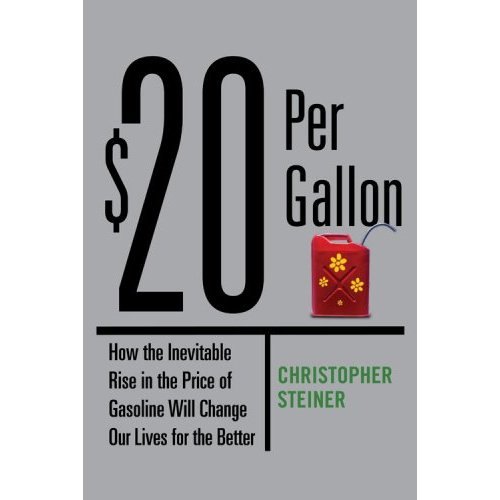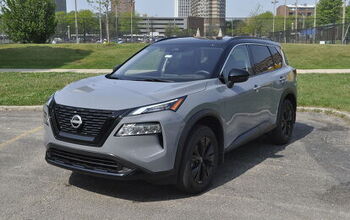Editorial: $20 a Gallon Gas a Good Thing, Not a Bad Thing. Apparently.
God forbid TTAC should criticize someone for making an outrageous suggestion to get people to think (rethink?) their opinion about an auto-related issue. But you gotta wonder if the book “$20 Per Gallon” is at least ten bucks too high in the hyperbole department. Still, credit where credit’s due. By setting sail on a ship fantasii, author, civil engineer (of all things) and Forbes reporter Chris Steiner has outed the environmental hairshirt wearers amongst us. Needless to say, the New York Times is chief amongst them. They’ve published a Q&A with Steiner that somehow manages not to lump-him-in with alien abduction deprogrammers—although the piece is filed under the Freakeconomics banner. Instead of demanding Steiner’s list of prescription drugs, the Gray Lady’s Annika Mengisen “asked him to give us his predictions for what our lives might look like with gas at $8 and $18 per gallon, respectively.” Fun!
Before we begin, an extract from the tome in question, courtesy of (who’d a thunk it) NPR.
In fact, many people’s lives, including many Americans’ lives, will be improved across a panoply of facets. We will get more exercise, breathe fewer toxins, eat better food, and make a smaller impact on our earth. Giant businesses will rise as entrepreneurs’ intrepid minds elegantly solve our society’s mounting challenges. The world’s next Google or Microsoft, the next great disrupter and megacompany, could well be conceived in this saga . . . This revolution will be so widespread and affect so many that it will evoke the Internet’s rise in the late 1990s.
But this revolution will be even bigger than that . . . This tale will bring with it all the global impact of a World War and its inherent technology evolutions — minus all the death. Some people even welcome oil’s coming paucity and expense as one of humankind’s grand experiments.
Utopia! We haven’t seen a good political polemic promising the best of all possible worlds since what, the sixties? To explore the possibilities, the New York Times turns on Q&A (the laziest, most editorially dubious journalistic format known to man). At $8 a gallon (2019), how will children get to school?
A: How you live largely depends on where you live. For people who live in walkable communities, life at $8-per-gallon gas will be far easier. Their kids will just hoof it.
Huh? Nebraska parents shudder at the thought. Anyway, you might have thought Steiner would be promoting mass transportation. Nope. Steiner reckons the school districts couldn’t afford to run busses. So . . . what?
Meanwhile, more family sacrifice at $8 a gallon. Steiner says Disney World’s toast; the cost of an economy class (presumably) round trip plane ticket will soar to a prohibitive $800. But hey, hybrids are go!
Consider this: driving will cost about three times as much as it does now at $8. That’s a giant difference. A family who now drives two cars 15,000 miles per year currently pays $325 a month for gasoline (assuming $2.60 and 20 m.p.g.). In a world of $8 gas, their monthly gas bill would be $1,000. That’s like a second mortgage. Costs like that will drive hybrids to be wildly popular — and so, too, will be the practice of cutting down on miles driven. The easiest way to do that, of course, is to get rid of your car, assuming you live in a place that will allow it (a lot of places don’t, obviously).
Obviously. But tough luck for them, eh? Next, the effect of $18 per gallon gas (2029 – 2039) on . . . sushi. Actually, that’s too far out there. So let’s go back to the “kids to school” issue:
By the time gas has reached $18, most people will live in places where density dictates that schools be grouped closer together, putting them within an easy walk or a brief bike ride.
Genetically speaking, that’s going to suck. But it does fit in with the whole smaller is better, global village, wear your hairshirt and like it mentality that’s informed the extremities of the environmental movement since ever there was one. As for personal transportation, fuhgeddaboutit.
At $18, you won’t have a driveway. There will be a whole generation of Americans growing up without cars at this point. They’ll live close to schools, close to new train lines, and close to places like restaurants and grocery stores. Electric cars will make an impact, but they won’t come in with the pricing power nor the volume to prevent massive changes in where we live and how we live.
So not even electric cars can save us? Holy shit that’s bad. So I guess we better enjoy our petrochemical lifestyle while we can, right? Right!
Eat sushi. Drive the trans-Canadian highway (in summer). Go to Australia. Go see Tokyo and take notes — life will be more like that and less like, say, Omaha, in the future.
So now you know: Tokyo’s going to be the new Omaha. So what of $20 a gallon gas? Too horrible to contemplate, I guess. Either that or the author, his argument and his interlocutor ran out of gas.
More by Robert Farago
Latest Car Reviews
Read moreLatest Product Reviews
Read moreRecent Comments
- Lorenzo I shop for all-season tires that have good wet and dry pavement grip and use them year-round. Nothing works on black ice, and I stopped driving in snow long ago - I'll wait until the streets and highways are plowed, when all-seasons are good enough. After all, I don't live in Canada or deep in the snow zone.
- FormerFF I’m in Atlanta. The summers go on in April and come off in October. I have a Cayman that stays on summer tires year round and gets driven on winter days when the temperature gets above 45 F and it’s dry, which is usually at least once a week.
- Kwik_Shift_Pro4X I've never driven anything that would justify having summer tires.
- Scotes So I’ll bite on a real world example… 2020 BMW M340i. Michelin Pilot Sport 4S. At 40k now and I replaced them at about 20k. Note this is the staggered setup on rwd. They stick like glue when they are new and when they are warm. Usually the second winter when temps drop below 50/60 in the mornings they definitely feel like they are not awake and up to the task and noise really becomes an issue as the wear sets in. As I’ve made it through this rainy season here in LA will ride them out for the summer but thinking to go Continental DWS before the next cold/rainy season. Thoughts? Discuss.
- Merc190 The best looking Passat in my opinion. Even more so if this were brown. And cloth seats. And um well you know the best rest and it doesn't involve any electronics...


































Comments
Join the conversation
@Stuki, Evidently, you've never had to cross Cambridge during a snow storm. Try that once and see how you feel. @Mr. Holzman, Agreed on the leaf-blower crowd. But remember they are generally employed by SUV-driving tree huggers - so you shouldn't expect too much. Re. Noise Pollution. Well, sans, RWR, you could have enjoyed more of the Jimmy Carter Economic morass - but in peaceful bliss, I guess. @golden2husky, Amen to that. Simple fact is that many people do drive with low tire pressure. We all know what that can mean, so why would anybody be hostile toward it? People weren't hostile to the fact that correctly inflated tires save fuel. People were hostile to the theory - stated as fact - that ensuring that every American vehicle was running on properly inflated tires ("tyres," katie) would be as great a benefit for the American Petro reserve as drilling in ANWAR. Of course THAT's just insane bobble-head-politico speak.